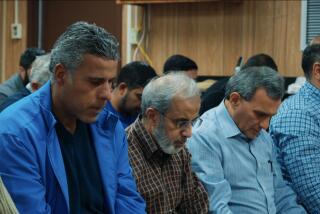Holding firm, yet remaining flexible
- Share via
She began dreaming of wearing an academic gown and a mortarboard with the confidence of a university graduate she had seen pictured in a newspaper that the village shopkeeper had used to wrap her food. She would sell fruits and vegetables picked up from the nearby mountains, and she would hide that money in a hole under a tree inside the courtyard of her family home.
Other village girls of her age used that money to buy pots and pans to get married, in the village tradition, at age 12, but she saved it as “backup.” She knew her family would never support her dream.
When she began pursuing it, she was asked to leave the house.
For 37-year-old Nigerian human rights lawyer Hauwa Ibrahim, the long road from her small village of Hinnah, in the state of Gombe, to her office in the capital city of Abuja is filled with landmarks of intense struggle and astonishing persistence. Years ago, when she was told by the local commissioner that she had little chance of entering a university without knowing English and having a secondary education, she discovered a new concept: “guts.”
“The commissioner said I had ‘guts,’ and I had to look it up in the dictionary to see what that word meant,” Ibrahim recalls with a laugh.
The first woman lawyer in her community, the Yamaltu district in northern Nigeria, she is comfortably sitting in the multi-hued conference room of the Feminist Majority Foundation in Beverly Hills. Arriving in Los Angeles this week to receive the 2005 Eleanor Roosevelt Award at the Inaugural Global Women’s Rights Awards Gala, Ibrahim would later stand along with fellow luminaries Jane Olson of the Human Rights Watch and Landmine Survivors, Rep. Hilda L. Solis (D-El Monte), and Cheryl Howard Crew, author of the just-released novel “In the Face of Jinn,” about two American sisters’ adventures on a business trip to India, to receive her award Thursday night.
In 2003, her characteristic guts coupled with her brilliant mind took her to a mosque to meet the mullahs of Abuja, who had been baying for Ibrahim’s blood since the day she began fighting Amina Lawal’s case. Lawal, a poor woman from a tiny village in northern Nigeria, in 2002 had been convicted of adultery and sentenced to death by stoning by the local shariah court that imposes Islamic law. By becoming Lawal’s defense counsel, Ibrahim had incurred the clergy’s wrath for being “anti-Islam” and “anti-shariah.” Refusing to sit on the chair she had been directed to sit on, Ibrahim had walked forward and knelt on the ground in front of the elderly clerics, her eyes downcast. “I said to them I am a foolish lawyer and a stupid girl, but I have come to seek their wisdom and knowledge so that I could go out and do the right thing,” she says. Perhaps “broken” by Ibrahim’s respect for her culture, the clerics later told her that they would neither oppose nor support her as she argued her case in court.
“That was all I needed,” she says. Lawal was acquitted that year and is married now, living in her village.
Ibrahim has fought more than 40 pro bono shariah-related cases since 1999, when some Nigerian states adopted Islamic law to deal with criminal issues. Returning home last fall after undertaking a one-year Humphrey Fellowship at American University Washington College of Law in Washington, D.C., she has taken up 32 new cases of both men and women, two of which involve death-by-stoning sentences for committing adultery. In fighting these, Ibrahim continues what she calls her “engagement” of the Nigerian clergy, mindful of the sociocultural sensitivities of her country.
“It’s beyond Amina.... It’s looking into the future,” she says. “If we are not careful in whatever we do today, we will either make our future or destroy it.”
Talking about the politico-legal intricacies back home, she says she has recently changed her strategy: Instead of making long arguments in court, she now writes letters to the grand qazi (chief justice) to point out the legal gaps in shariah’s jurisdiction over criminal matters. In doing so, she stands committed to her past strategy of not confronting Islamic law but working within its framework to save the life of her client. Ibrahim’s long-term strategy is to create regional networks with moderate Islamic countries, and international networks with organizations like the Feminist Majority Movement in “trying to diffuse the extremist interpretation of the Koran and the Hadith” (the sayings of prophet Mohammed).
On the night of her award, Ibrahim stood amid the glitz of the award ceremony at the Beverly Hills Hotel. Cloaked in flowing olive green and gold Nigerian robes and a matching headdress, she was both fascinated and inspired by her surroundings: Hollywood celebrities Jay Leno, Ron Howard and Gillian Anderson were among the guests.
“When I entered the hotel, I said to myself, ‘What history!’ ” she exclaims. “And then I saw the personalities here -- the old, the middle-aged and the young -- what a blend!”
For Ibrahim, this blend is a message of the continuing struggle for enhancement of women’s rights, flowing from one generation to the next. She praised the event organizers for their “creativity.” “It’s a wonderful way for us to seek funds for our work as well as maintain our dignity.”
Feminist Majority Movement President Eleanor Smeal noted that the awards were meant to focus attention on the women’s work and help them to get recognized. “We want to bring visibility and credit to their work, because with visibility comes power.”
More to Read
Sign up for Essential California
The most important California stories and recommendations in your inbox every morning.
You may occasionally receive promotional content from the Los Angeles Times.













